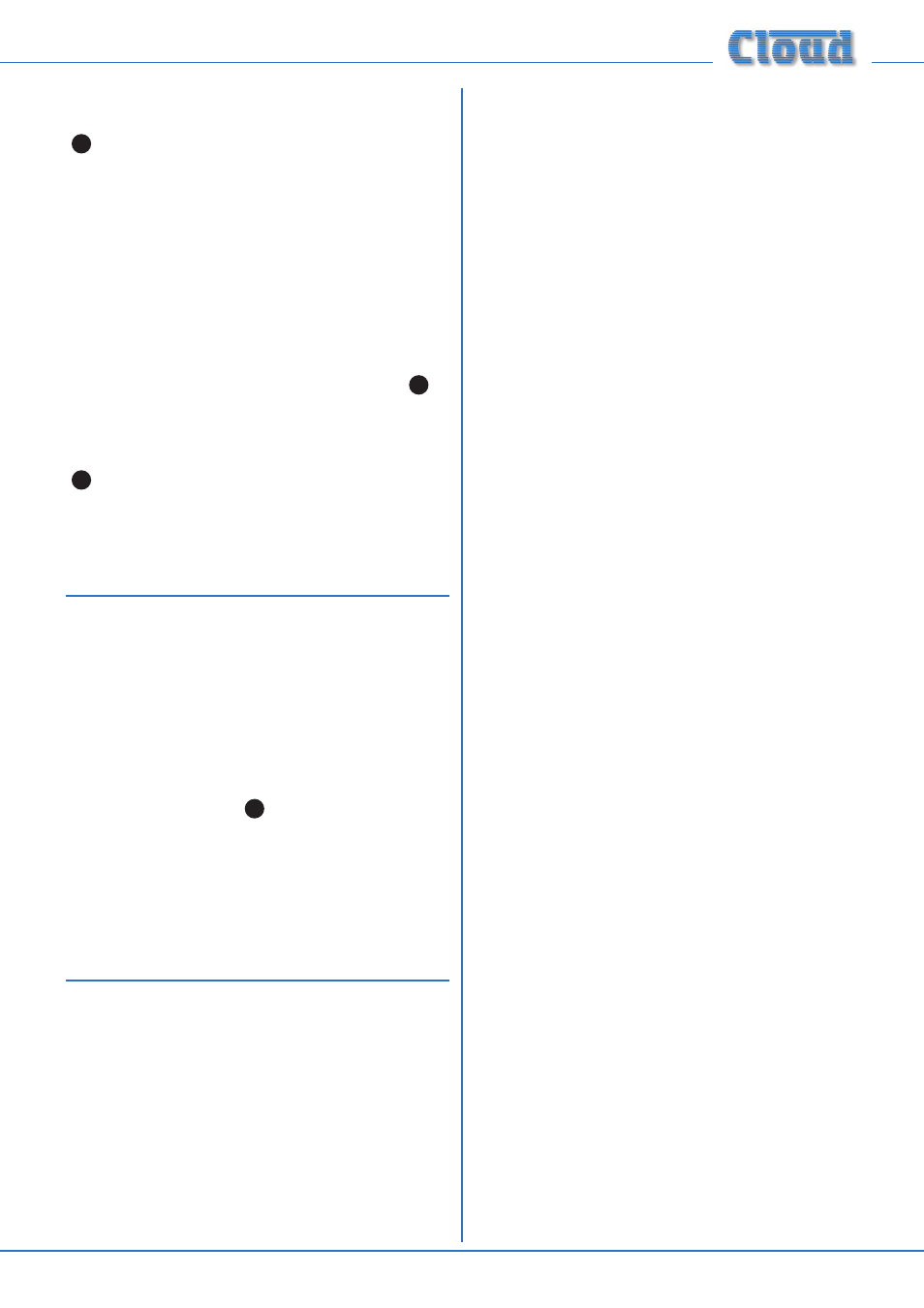Gain & level, Eq & high-pass filter, Zone outputs – Cloud Electronics Z4ii User Manual
Page 17: Priorities

Z4
II
& Z8
II
Installation and User Manual v1.0
17
Gain & level
The paging mic input has a rear panel preset gain control
(
7
on page 9). A wide range of gain is available and there
should be no problem in obtaining a satisfactory level from
most paging microphones.
The mic gain control should be adjusted by making an
announcement. Set the front panel Paging Mic Level preset
control at about halfway and listen in a convenient zone; the
rear panel gain control should be carefully advanced until
the announcement is heard clearly and without distortion.
If possible, the person who will normally make paging
announcements should speak when making this adjustment.
Following the setting of the paging mic gain, the paging level
in all the other zones should be set, by listening in each zone,
with the Paging Mic Level controls on the front panel (
5
EQ & high-pass filter
The paging mic input has associated HF and LF EQ controls
(
8
- Rear Panel Description) These are identical to
the MIC1 & 2 EQ controls and should be adjusted similarly.
A 100Hz fixed filter is also included in the circuitry, as with
the other mic inputs.
Zone Outputs
In normal operation, the music level in each zone will
be set by the front panel Music Level control, or by a
corresponding control on a remote plate. Follow the
procedure described in Music Inputs - Gain & level (page 16)
to adjust the music level in each zone.
EQ
The various zones in a building often have different
acoustic properties, and may also have different models
of loudspeaker installed. The Z4
II
and Z8
II
are fitted with
HF and LF EQ adjustments (
11
on page 9) for the music
signal at each zone output to enable the audio frequency
response to be best matched to each zone. The controls
should be adjusted by listening; up to 10 dB of cut or boost
at 10 kHz (HF) and 50 Hz (LF) is available. Note that these
EQ adjustments do not affect the frequency response of
microphones or paging.
Priorities
The Z4
II
and Z8
II
offer several options for determining what
happens to music signals when announcements are made.
The options are selected via internal jumpers, and should
be set to suit the requirements of the installation when the
system is installed. See page 23 for location of the internal
jumpers.
Mic 1/Mic 2 priority
By default, fully automatic, voice operated priority
is provided for the microphone inputs. When either
microphone is used, all music signals will attenuate by
approximately 30 dB; after the announcement, the music
signals will restore smoothly to their former level, over a
period of 3, 6 or 12 seconds.
The Mic 1/Mic 2 priority over music can be disabled on a
per-zone basis by setting J6 on the relevant zone sub-board
to the ‘OFF’ position. The release time may also be set on
a per-zone basis to 3S or 6S by moving J3, or to 12S by
removing J3 altogether. Note that the release time setting
will apply to all music ducking, regardless of which priority
setting initiates it.
Paging mic priority
When an announcement is made via the paging mic input,
it has full priority over both the music signals and any
microphones in use via Mic 1 and Mic 2 inputs. This is a fixed
priority, and cannot be overridden.
The paging mic priority can be triggered either by voice
detection or by the grounding of the access contact; the
sub-board jumper J5 can be set to ‘VOX’ for voice triggering
(the default) or set to ‘SW’ for access contact triggering. If
PM Series multi-zone paging microphones form part of the
system, J5 should be set to ‘SW’.
When multiple PM Series paging microphones are in use, it
is possible for one to have a priority over the others. This
is a function of the microphones, not of the mixer; please
consult the PM Series User and Guide for more information.
Line 6 priority
It may sometimes be necessary for one music input to have
priority over all the others; for example, a jukebox in a bar,
or a digital sound store programmed to make automatic
announcements in a public space. Line input 6 may be set
to have priority in any or all zones over whichever source
is selected for the zone by its Music Source control. This
priority is set by moving jumper J2 to the ‘ON’ position on
as many zone sub-boards as required. (The default setting is
‘OFF’.)
When the priority is selected, a signal present at Line 6
will force the zone’s source selection to that input; when
the signal disappears, the previously-selected source will be
restored over the time constant selected by J3.
Microphone priority over input at Facility
Port
If an LM-1 or DM-1 remote input plate is in use in a zone, it
is possible to give any microphone connected at the mixer
itself (i.e., Mic 1, Mic 2 or a paging mic) priority over input
sources connected at the plate. This might be desirable
in function rooms, for example, where building-wide
announcements may need to to interrupt any local use.
This priority is set by J4 on the zone sub-board. The
default setting is ‘OFF’; in this position microphones or
other sources connected at remote input plates will be
autonomous and will not be overridden by announcements
made via the mixer’s mic inputs. Setting J4 to ‘ON’ will give
Mic 1, Mic 2 and the paging mic inputs priority.
Note that this priority is independent of the music ducking
function which can be selected on the remote plates.
